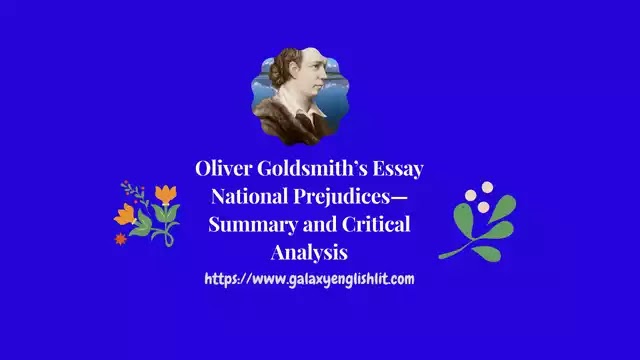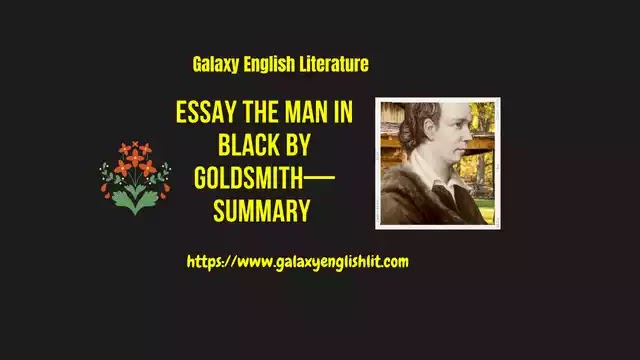Introduction of the Story:
Like many of O. Henry's short stories, ‘Hearts and Hands’ is an interesting story which is full of suspense. The story has surprising ending. The story deals with generous, kind and sympathetic nature of the marshal for the convict. It is because of having compassionate heart that the marshal tells a lie to Miss Fairchild and he does this to save Mr. Easton from the humiliation of being identified as a convict in front of an old friend.
 |
| Theme and Summary of the Story Hearts and Hands by O. Henry |
In the story, O. Henry suggests that the people often jump to conclusions that are not true and ignore seemingly obvious details. The narrator does not intervene in the story, but merely presents the things sequentially to make the readers understand how judging people only by their appearance often lead us to trouble. By presenting the observation of the co - passengers, O. Henry is able to provide an ironical twist to his story which makes us not only enjoy the story, but at the same time understand few truths to be perceptive, not to judge people by their appearance, to be compassionate etc.
Theme of the Story:
In the story, O. Henry may be exploring the theme of appearance, freedom, imitation, honesty, identity and paralysis. Easton is not who he seems to be. Rather than being the marshal he is a charming prisoner. Apart from the couple at the end of the story nobody else suspects that Easton is the prisoner. This suggests that Easton is good at fooling people. Just as he is going to prison for counterfeiting, Easton is also an imitation which may be the point that Henry is attempting to make. Throughout the story Easton is not only charming to Miss Fairchild but he is polite too. Both these traits would not exactly be traits that one would associate with a criminal. It is Easton's purpose to befool people in life. Something he nearly manages to do with everybody on - board the train. It is also clear that Easton was once a suitor to Miss Fairchild though it appears whatever occupation he had at the time was not as good as Miss Fairchild's other suitor, an ambassador . This may be important as though the reader is aware that Easton is a counterfeiter, he also appears to be playing with his identity. He may not have been a criminal when he was attempting to court Miss Fairchild in Washington.
O. Henry also appears to be exploring the theme of freedom. It is clear that Easton has or is about to lose his freedom for seven years but what isn't as obvious is the fact that Miss Fairchild too has lost her freedom. She much prefers the West to Washington. It is as though she feels stifled in Washington. Having to live her life as others think, she should live her life. The setting of the story is also interesting as a train cabin would be a confined space and in many ways the cabin acts as foreshadowing. Easton is to spend seven years in a confined space, a prison cell. It may also be important that the real Marshal does not embarrass Easton by telling Miss Fairchild that Easton is in fact a prisoner and not a marshal. By doing so Henry manages to allow Easton that last bit of freedom to express himself as he would like to express himself.
It is also interesting that Easton is a slight mystery to the reader. Though the reader never knows as to why Easton turned to counterfeiting it is possible that he longed for a life that was better than the life he had. Already he was rejected by Miss Fairchild and he may have thought that if he possessed money, love too would come next. What is also intriguing is that at no stage in the story Easton has been honest. He is hiding behind a mask. In essence he is as unreal as the counterfeit money he printed. There is no sense that Easton is prepared to live his life honestly. First he counterfeits money, then he takes on the persona of the marshal. Rather than being real or himself Easton is an imitator though it is not a crime in itself. Many people live their lives pretending to be something they are not. What is criminal is the fact that Easton printed counterfeit money.
It may also be important that at no stage Easton drops his guard. He has a role to play and he plays it well. The reader also suspects that after Easton has served his seven years in prison he may not necessarily change. If Easton remains the same, it would be a state of paralysis in his life. He is not going to make progress particularly for the next seven years which he is in prison. The only tools that Easton has at his disposable are those that will lead him back into a life of crime. There is no sense that Easton will redeem himself while in prison. He had a chance at redemption when talking to Miss Fairchild. He could have been honest and told her that he was not the marshal but instead played the role of imitator..
Summary of the Story:
The story takes place on a train to Denver. An elegantly attired lady whose name was Miss Fairchild was seated in one coach. The lady looked very beautiful. She was a perfect embodiment of Western culture. She seemed to be an experienced traveller. Like an experienced traveller, she was surrounded by all the luxurious comforts. The two young men entered the same coach and took their seat in front of the lady. One of them was the young man of charming personality. He seemed to be a man of bold, frank countenance and manner. The other young man was rough, sad - looking and heavily built. The two were handcuffed together.
At first, the beautiful lady showed an indifferent attitude towards them and looked at them with disinterest, but as she recalled something, a lovely smile was visible at her face. Then addressing Mr. Easton, she asked him if he never recognised old friends when he met them in the West. The young man named Mr. Easton was badly startled to hear the sweet and well - known (familiar) voice of a woman. As the young man was very well familiar with the lady, it was natural for him to feel embarrassed, but he soon overcame his embarrassment and then clasped her finger with left hand. Calling the lady by her name, he gave a smile and asked her to excuse him for using his left hand instead of using the right as his right hand was engaged at the present. For showing her, Mr. Easton raised his right hand, bound at the wrist by the shining handcuff to the left one of his companion. When she found Mr. Easton in such a state, her happiness disappeared. She was extremely bewildered with horror to see this sight.
The glum - faced man who was a marshal and had been watching the lady's face with veiled glances from his keen, shrewd eyes, understood the gravity of the situation. Before Mr. Easton could say something, the marshal intervened and consoled the lady saying that Mr. Easton was the marshal who was taking him (the marshal) to Leavenworth prison for seven years imprisonment for counterfeiting. Having heard that Mr. Easton was a marshal, she took a sigh of relief.
As the conversation began between Mr. Easton and the lady, she was surprised to know that Mr. Easton had discarded his life in Washington to become a marshal in the West. Mr. Easton told Miss Fairchild that he wanted to do something for his better future and wished to live a happy and luxurious life but the money was the vital need to fulfil this purpose. Then, he added that as she was very well aware of the fact that the money was the essential thing to keep step with the crowd in Washington, hence, he thought to seek the opportunity in the West and became a marshal.
Mr. Easton continued his conversation with the lady, Miss Fairchild. Then trying to convince the lady and turning her mind from the reality, he told Miss Fairchild that the job of Marshal was not as a high position as that of an ambassador . When Mr. Easton showed his unhappiness with the present position of a marshal, Miss Fairchild reacted immediately with a warm reply that she liked him more than she liked the ambassador and that she was no longer in touch with the ambassador. Miss Fairchild was so much impressed with the present position of Mr. Easton that she called him one of the dashing Western heroes who rode and shot and went into all kinds of dangers.
The lady, Miss Fairchild kept on staring at the handcuffs while conversing with Easton. When she once again looked at the handcuffs , the other man who was real marshal , consoled her saying that all the marshals handcuffed themselves to their prisoners to keep them from getting away and Mr. Easton was very well aware of his business . Then the young lady asked Mr. Easton if they would see again soon in Washington. At this Mr. Easton was somewhat puzzled and told her that it was impossible for him to meet soon because the days of his freedom were over. The lady was unable to understand his words. The lady took his words in a simple way. She seemed to be ignorant of the reality.
Then, during conversation, she told Mr. Easton that she and her mother spent the summer in Denver and she also went home a week ago because her father was slightly ill. Then she appreciated the surroundings of the West. She also told him that she did not give much importance to the money and called those people foolish who were not satisfied with what they possessed but in order to make a great heap of money they were always running after it. When the other man who was the real marshal found that the young lady named Miss Fairchild was not ready to stop her conversation with Mr. Easton and was developing a kind of intimacy with Mr. Easton, he feared lest Mr. Easton should reveal something about himself. So he asked Mr. Easton to take him out to the smoker car for a smoke which he complied with. The excuse allowed the men to leave Miss Fairchild.
As both the men left, the point of view shifted to two different passengers who had been listening to the conversation between Miss Fairchild, Mr. Easton and the glum - faced man. One of them remarked on how young the marshal was and the other corrected the mistake saying that it was actually the glum - faced man who was marshal and Mr. Easton was going to prison for seven years for counterfeiting money . The detail was that Mr. Easton's right hand was cuffed to the marshal's left hand. It was clear that the marshal would choose to cuff his non - dominant hand to the prisoner's dominant one.





